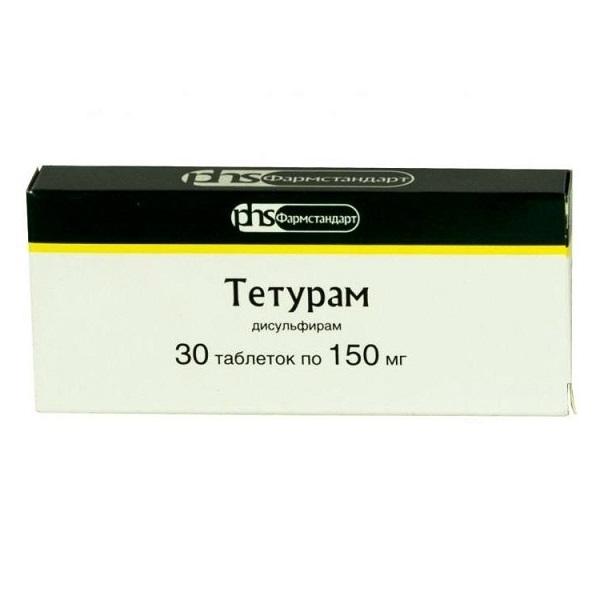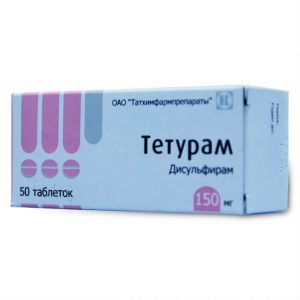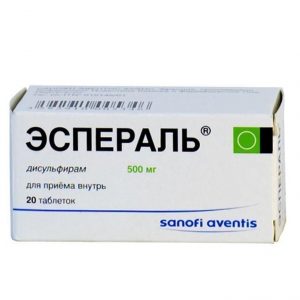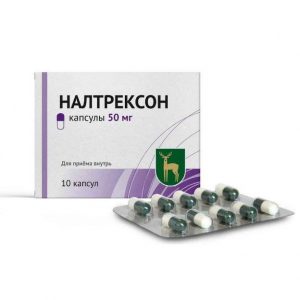Description
Packing
In a package of 30 pieces.
Pharmacological action of
Teturam inhibits acetaldehyde dehydrogenase, which is involved in the metabolism of ethanol, increases the concentration of acetaldehyde, which is a metabolite of ethanol and causes a number of unpleasant sensations after its use (flushing, nausea, vomiting, vomiting, sensation. As a result, a conditioned reflex reaction of disgust for the taste and smell of ethanol occurs. The duration of action of oral tablets is 48 hours. The use in the form of implants creates a constant concentration of the drug in the body. Disulfiram-ethanol reactions can occur within 5 9 months after implantation. In the case of ethanol, lipid mobilization occurs, blood vessels dilate and blood flow rises at the site of implantation, resulting in increased disulfiram intake in the blood.
Indications
– Treatment and prevention of relapse of chronic alcoholism.
– As a detoxification agent for chronic nickel poisoning.
Contraindications
Absolute:
– Severe diseases of the cardiovascular system.
– The organ of hearing (neuritis of the auditory nerve).
– The organ of vision (glaucoma, optic neuritis).
– Bronchial asthma.
– Emphysema of the lungs.
– Pulmonary Tuberculosis.
– Severe liver failure.
– Diseases of the blood-forming organs.
– Diabetes mellitus.
– Thyrotoxicosis.
– Epilepsy.
– Convulsive syndrome of any genesis.
– Mental Illness.
– Exacerbation of peptic ulcer.
– Kidney disease.
– Malignant tumors.
– Polyneuritis of any etiology.
– Pregnancy.
– Increased individual sensitivity to the drug.
Relative:
– Compensated cardiovascular disease.
– Old age (over 60 years old).
– Peptic ulcer of the stomach and duodenum in remission.
– Residual effects after NMC.
– Previously transferred teturamic (antabuse) psychoses.
Use during pregnancy and lactation
Contraindicated during pregnancy and lactation.
Composition
1 tablet contains: tetram 150 mg.
Excipients: potato starch, stearic acid, aerosil.
Dosage and administration
Treatment is prescribed after a thorough examination of the patient and warning about the consequences and complications. The drug is taken orally at 150-500 mg 2 times a day according to an individual scheme. After 7-10 days, a teturamalcoholic test is carried out (20-30 ml of 40% vodka after taking 500 mg of the drug), with a weak reaction, the dose of alcohol is increased by 10-20 ml (the maximum dose of vodka is 100-120 ml). The test is repeated after 1-2 days in the hospital and after 3-5 days on an outpatient basis, with dose adjustment of alcohol and / or the drug as necessary. In the future, you can use a maintenance dose of 150-200 mg per day for 1-3 years.
Side effects
During treatment with Teturam, a bitter taste in the oral cavity, headache, dizziness, memory impairment, insomnia, anxiety may appear. The most common side effects of Teturam are allergic reactions – hives, skin rashes, Quincke’s edema, bronchospasm, dermatitis. When implanting Teturam tablets, rejection may occur, which manifests itself in the form of collapse, arrhythmia, cerebral edema, suppuration, heart attack.
Drug Interaction
Contraindications combinations
Alcohol: intolerance reaction (ebb, erythema, vomiting, tachycardia). Avoid taking alcoholic beverages and medicines containing alcohol.
Undesirable combinations
Isoniazid: impaired behavior and coordination.
Nitro-5-imidazoles (metronidazole, ordinazole, secnidazole, tinidazole): delirious disorders, confusion.
Phenytoin: A significant and rapid rise in plasma phenytoin levels with toxic symptoms (suppression of its metabolism).
If the combination cannot be avoided, clinical monitoring and control of drug concentrations should be performed in the plasma of entry and after treatment with teturam.
Combinations with caution
Warfarin (and other oral anticoagulants): increased effect of oral anticoagulants and risk of bleeding (decreased disintegration of warfarin in the liver). More frequent monitoring of warfarin concentration and dose adjustment of anticoagulants within 8 days after withdrawal of teturam is recommended.
Theophylline: teturam inhibits the metabolism of theophylline. As a result, the dose of theophylline should be adjusted (reduced dosage), depending on the clinical symptoms and the concentration of the drug in the plasma.
Benzodiazepines: teturates can potentiate the sedative effect of benzodiazepines by inhibiting their oxidative metabolism (especially chlordiazepoxide and diazepam). Benzodiazepine dosage should be adjusted according to clinical manifestations.
Tricyclic antidepressants: may increase the intolerance of alcohol intolerance (especially if patients are taking alcohol while taking teturam).
overdose
Symptoms: combination of teturam-ethanol can cause depression of consciousness up to coma, cardiovascular collapse, neurological complications.
Treatment: symptomatic.
Storage conditions
Store in a dry, dark place at a temperature not exceeding 25 ° C.
Expiration
4 years.
Deystvuyuschee substances
Disulfiram
Pharmstandard-Leksredstva Russia




